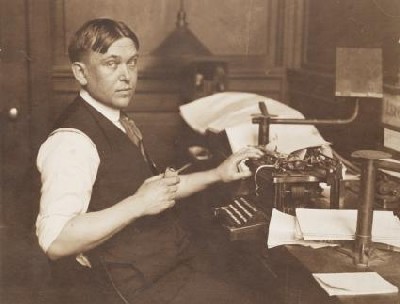“Screenplays can’t be works of art unto themselves because they’re not unto themselves, they’re roadmaps to something else.”
Lem Dobbs, interview with Dan Schneider (Cosmoetica, January 25, 2009)
Archives for 2011
TT: So you want to see a show?
Here’s my list of recommended Broadway, off-Broadway, and out-of-town shows, updated weekly. In all cases, I gave these shows favorable reviews (if sometimes qualifiedly so) in The Wall Street Journal when they opened. For more information, click on the title.
BROADWAY:
• Anything Goes (musical, G/PG-13, mildly adult subject matter that will be unintelligible to children, closes Jan. 8, reviewed here)
• Born Yesterday (comedy, G/PG-13, closes July 31, reviewed here)
• The House of Blue Leaves (serious comedy, PG-13, closes July 23, reviewed here)
• How to Succeed in Business Without Really Trying (musical, G/PG-13, perfectly fine for children whose parents aren’t actively prudish, reviewed here)
• The Motherf**ker with the Hat (serious comedy, R, adult subject matter, closes July 17, reviewed here)
OFF BROADWAY:
• Avenue Q (musical, R, adult subject matter and one show-stopping scene of puppet-on-puppet sex, reviewed here)
• The Fantasticks (musical, G, suitable for children capable of enjoying a love story, reviewed here)
• Play Dead (theatrical spook show, PG-13, utterly unsuitable for easily frightened children or adults, reviewed here)
IN CHICAGO:
• The Front Page (comedy, PG-13, extended through July 17, reviewed here)
CLOSING SOON ON BROADWAY:
• The Importance of Being Earnest (high comedy, G, just possible for very smart children, closes July 3, reviewed here)
CLOSING SOON IN CHICAGO:
• Porgy and Bess (operatic musical, PG-13, extended through July 3, reviewed here)
CLOSING NEXT WEEK IN WASHINGTON, D.C.:
• Follies (musical, PG-13, adult subject matter, closes June 19, reviewed here)
CLOSING SUNDAY OFF BROADWAY:
• By the Way, Meet Vera Stark (comedy, PG-13, reviewed here)
• A Minister’s Wife (serious musical, G, far too complicated for children, reviewed here)
CLOSING SUNDAY ON BROADWAY:
• Million Dollar Quartet (jukebox musical, G, reviewed here, reopening off Broadway in July)
TT: Almanac
“I don’t quite understand myself how, why, or when technology and the technical aspects of filmmaking completely overran, overcame, overwhelmed the human, the emotional, the intellectual, the real. Was it when kids first started bringing pocket calculators to school with them? They would have been more or less the first film school generation. So there came to be filmmakers who were somehow excited by Kurosawa, but not by the Western Canon that excited him–Shakespeare, Dostoyevsky–and who thought Godard’s jump-cuts were sexy, but could no more discuss his interest in Nicholas Ray or the dialectics of Marxism than they could fly to Mars, filmmakers who can imitate Hitchcock’s technique, but are incapable of emulating his emotional or narrative complexity. Writers, directors, actors, even when relatively young, once seemed mature. Somewhere along the line, quite recently, that changed. Now, no matter what their age, they’re immature, and the films reflect that. The obsession with technology appears to have accelerated this process of infantilism and occluded all else.”
Lem Dobbs, interview with Dan Schneider (Cosmoetica, January 25, 2009)
TT: Snapshot
Leadbelly and John Lomax appear in a 1935 March of Time newsreel:
(This is the latest in a weekly series of arts-related videos that appear in this space each Wednesday.)
TT: Almanac
“Of all the arts I suppose that writing is the one which develops the lowest attributes, in that its very pursuit magnifies all the human failings. It encourages introversion, neurasthenia, insomnia, irritability and all forms of self-indulgence. It encourages a sensitiveness which makes one open to any sort of slight. It begets a type of personal inflation, for it is nearly impossible to continue without the consciousness of a definite gift of genius. It may be that one is misunderstood by editors, perhaps because one is too far advanced to be comprehended by the simple moron mind. It may be that this hidden gift still lies fallow, but there must be an inner conviction of its presence. It is what enables an author to walk airily among his colleagues and to dispense and to receive the bitter little condescensions of the trade. There is a jealousy in the writing profession which is peculiarly its own.”
John P. Marquand, Wickford Point
TT: One is a wanderer
 I left my home town a few months after graduating from high school in 1974, and since then I’ve only returned as a visitor. Not so David, my younger brother, who chose to settle in Smalltown, U.S.A., and has never lived anywhere else. He and his wife live three blocks from my mother’s house. If there’s such a thing as a model citizen, he fills the bill with room to spare. Among countless other valuable things, he’s served two terms on the city council and is a member of the board of trustees of his church, and whenever anyone in Smalltown now has occasion to mention the name “Teachout,” they usually mean him, not me.
I left my home town a few months after graduating from high school in 1974, and since then I’ve only returned as a visitor. Not so David, my younger brother, who chose to settle in Smalltown, U.S.A., and has never lived anywhere else. He and his wife live three blocks from my mother’s house. If there’s such a thing as a model citizen, he fills the bill with room to spare. Among countless other valuable things, he’s served two terms on the city council and is a member of the board of trustees of his church, and whenever anyone in Smalltown now has occasion to mention the name “Teachout,” they usually mean him, not me.
I’m proud of my brother’s achievements, and more than a little bit jealous of them. In particular I envy his deep roots in the soil of Smalltown. I can’t claim to feel that way about New York City, where I’ve lived for the past quarter-century but to which I have no special attachment save for my love of certain people who live there.
For me, “home” is where Mrs. T is, and that changes from day to day. We moved to a new apartment last November, but we’ve spent so little time there that most of our belongings are still packed in cardboard boxes. So far this year we’ve “lived” in upper Manhattan, rural Connecticut, various parts of Florida, and a string of hotel rooms in Chicago, San Diego, and Washington, D.C. Right now we’re in Smalltown, but we’ll be driving up to St. Louis on Thursday, and a week and a half after that we’ll be on our way to Pittsburgh.
Truth to tell, I’m about as close to rootless as you can get, and because I come from Smalltown, where people tend as a rule to grow where they’re planted and stay where they’re put, this rootlessness has always seemed strange to me. I ought to feel at home somewhere or other, but when I moved away in 1974, I lost the sense of belonging that I possessed throughout the first eighteen years of my life, and since then I’ve never managed to recapture it.
This came as a surprise to me. I always figured I’d find a job in town, marry a Smalltown girl, start a family, and become a pillar of the community. My brother did those things, but I pulled up stakes and became a rambling man, moving from city to city in search of an identity that it took me the better part of a lifetime to find, insofar as I can be said to have found it. At various times in my life I expected to become a concert violinist, a lawyer, a high school teacher, and a psychotherapist, none of which I ended up doing. Instead I’ve paid the rent by working as a bank teller, a jazz bassist, a magazine editor, an editorial writer, a biographer, and a drama critic.
 My brother and I, in short, have both led typical American lives. It is fully as American to stick close to home as it is to become a wanderer, but it’s the wanderers who get most of the press, perhaps because we’re the ones who write it–and I’m not so sure it should be that way. I left home to find myself, but my brother didn’t have to leave home because he knew who he was. I call my mother every night, but he sees her every day. I write books, but he has a grown daughter. I like to think that my work may ultimately prove to have some lasting value, but I’m sure that he’s done more to make the world a better place.
My brother and I, in short, have both led typical American lives. It is fully as American to stick close to home as it is to become a wanderer, but it’s the wanderers who get most of the press, perhaps because we’re the ones who write it–and I’m not so sure it should be that way. I left home to find myself, but my brother didn’t have to leave home because he knew who he was. I call my mother every night, but he sees her every day. I write books, but he has a grown daughter. I like to think that my work may ultimately prove to have some lasting value, but I’m sure that he’s done more to make the world a better place.
Might I have been happier had I stayed in Smalltown? That is, needless to say, the least answerable of questions, though Stephen Sondheim went part way towards answering it in a song from Follies called “The Road You Didn’t Take”: The choices that you make/Aren’t all that grim./The worlds I’ll never see/Still will be around,/Won’t they?/The Ben I’ll never be,/Who remembers him? Nobody remembers the nonexistent Terry Teachout who stayed home and became a schoolteacher, but everybody in Smalltown, U.S.A., knows his real-life brother David, who had the luck to know which road to take–and the sense to take it. As much as I love my life, I’ll always wonder which one of us made the better call.
TT: Only once
 A colleague of mine has just published his first book, a great day that puts me in mind of my favorite paragraph from H.L. Mencken’s Newspaper Days, in which Mencken recalled an equally great day that took place when he was working under Lynn Meekins at the now-defunct Baltimore Herald. I reprint it here in tribute to my fortunate colleague.
A colleague of mine has just published his first book, a great day that puts me in mind of my favorite paragraph from H.L. Mencken’s Newspaper Days, in which Mencken recalled an equally great day that took place when he was working under Lynn Meekins at the now-defunct Baltimore Herald. I reprint it here in tribute to my fortunate colleague.
* * *
I recall, in point, the day when the proofs of my first real book, “George Bernard Shaw: His Plays,” came in. It was a small volume, else I could not have found the time to write it at all, but it was nevertheless a book, set up and to be published by a real publisher, and I was so enchanted that I could not resist taking the proofs to the office and showing them to Meekins–on the pretense, as I recall, of consulting him about a doubtful passage. He seemed almost as happy about it as I was. “If you live to be two hundred years old,” he said, “you will never forget this day. It is one of the great days of your life, and maybe the greatest. You will write other books, but none of them will ever give you half the thrill of this one. Go to your office, lock the door, and sit down to read your proofs. Nothing going on in the office can be as important. Take the whole day off, and enjoy yourself.” I naturally protested, saying that this or that had to be looked to. “Nonsense!” replied Meekins. “Let all those things take care of themselves. I order you to do nothing whatsoever until you have finished with the proofs. If anything pops up I’ll have it sent to me.” So I locked myself in as he commanded, and had a shining day indeed, and I can still remember its unparalleled glow after all these years.
TT: Almanac
“It was amusing to observe that Allen became hesitant, now that he reached the point, and I knew how he felt. He was no longer Dr. Southby, but a tyro who desired a favorable judgment or none at all. He was like a young writer in an editor’s office, explaining the inner meaning of what he had written so that one could understand it before one read it.”
John P. Marquand, Wickford Point
